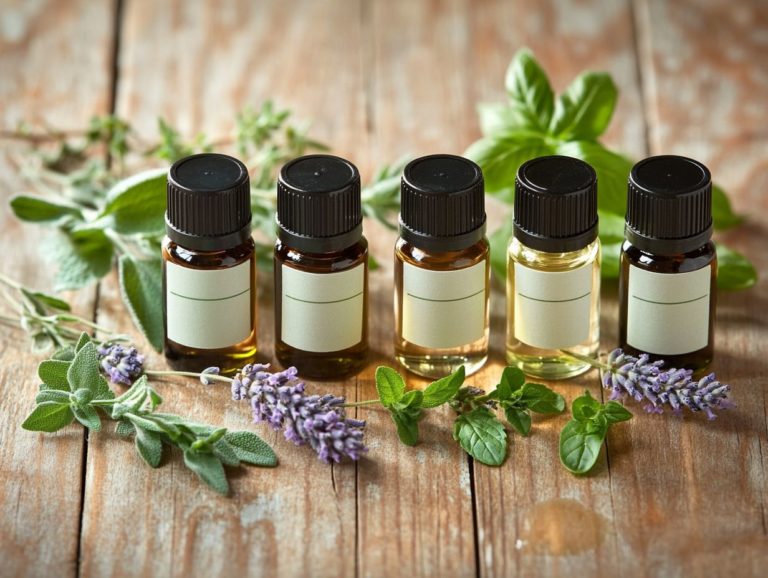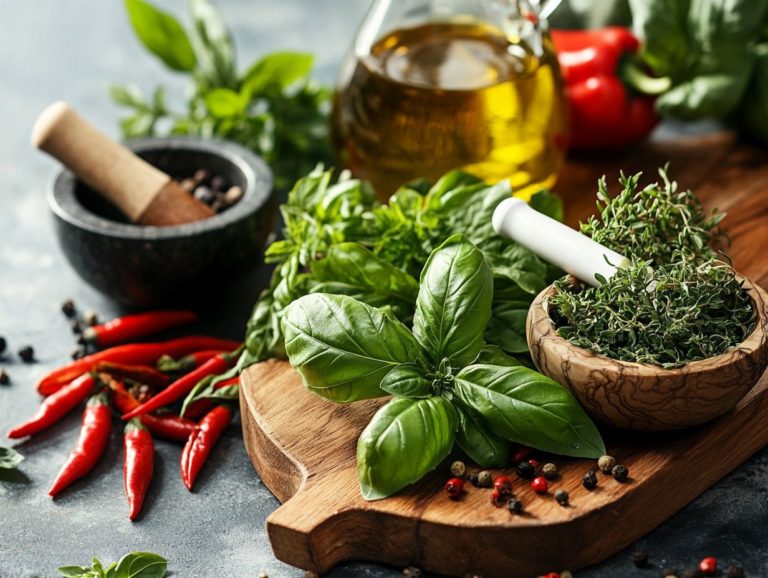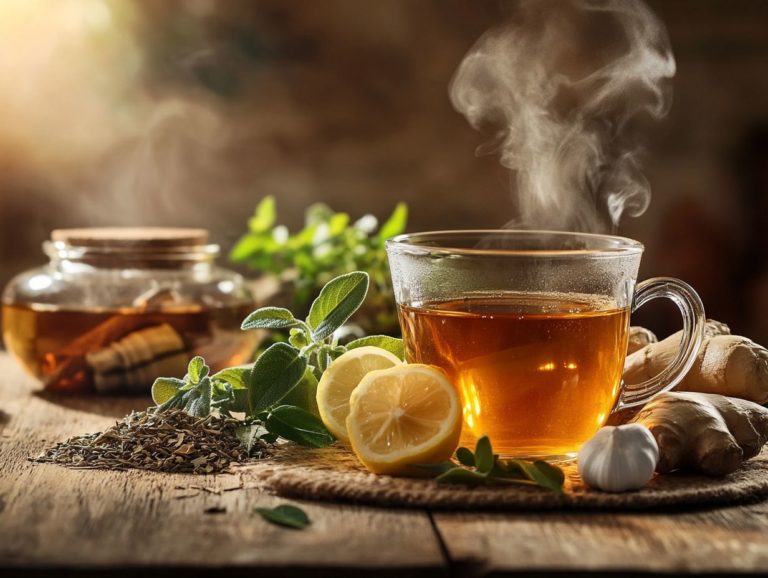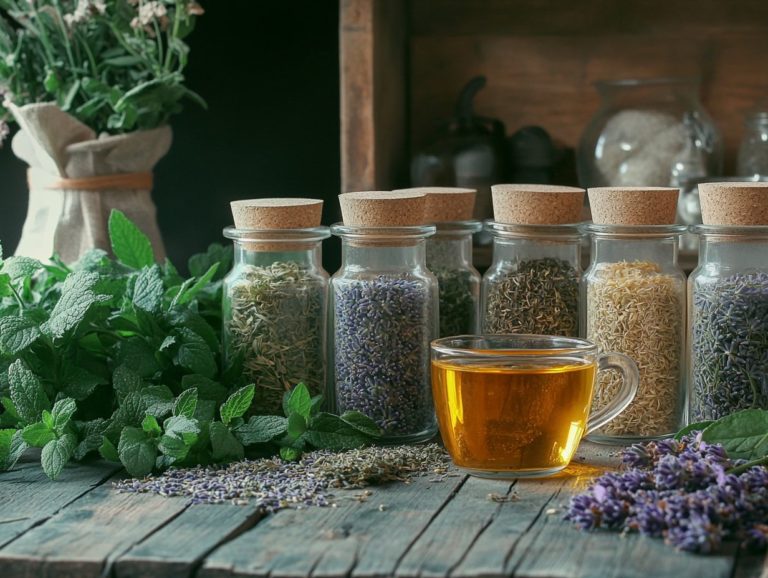Top 10 Adaptogenic Herbs for Stress
In today s fast-paced world, managing stress is more crucial than ever for you.
Enter adaptogenic herbs nature s elegant solution to help your body cope with life s pressures.
This article delves into the top 10 adaptogenic herbs, including Ashwagandha, Rhodiola, and Ginseng, each offering unique benefits that can aid in stress reduction and enhance your overall well-being.
You ll learn how these remarkable plants work, ways to seamlessly incorporate them into your routine, potential side effects to be aware of, and tips for choosing the best options available.
Discover how you can harness the power of nature to achieve balance and resilience in your daily life.
Contents
- Key Takeaways:
- 1. Ashwagandha
- 2. Rhodiola
- 3. Holy Basil
- 4. Reishi Mushroom
- 5. Schisandra
- 6. Ginseng
- 7. Licorice Root
- 8. Maca
- 9. Cordyceps
- 10. Astragalus
- What Are Adaptogenic Herbs and How Do They Work?
- How Can Adaptogenic Herbs Help with Stress?
- What Are the Different Types of Adaptogenic Herbs?
- How Can One Incorporate Adaptogenic Herbs into Their Daily Routine?
- What Are the Possible Side Effects of Using Adaptogenic Herbs?
- Can Adaptogenic Herbs Interact with Medications?
- Are There Any Contraindications for Using Adaptogenic Herbs?
- How Can One Determine the Right Dosage for Adaptogenic Herbs?
- What Are Some Tips for Choosing High-Quality Adaptogenic Herbs?
- What Are Some Other Natural Ways to Manage Stress?
- Frequently Asked Questions
- What are adaptogenic herbs and how can they help with stress management?
- What are the top 10 adaptogenic herbs for stress management?
- How does ashwagandha help with stress management?
- Can adaptogenic herbs be taken in combination with each other?
- Are there any side effects of using adaptogenic herbs for stress management?
- How can adaptogenic herbs be incorporated into a daily routine?
Key Takeaways:
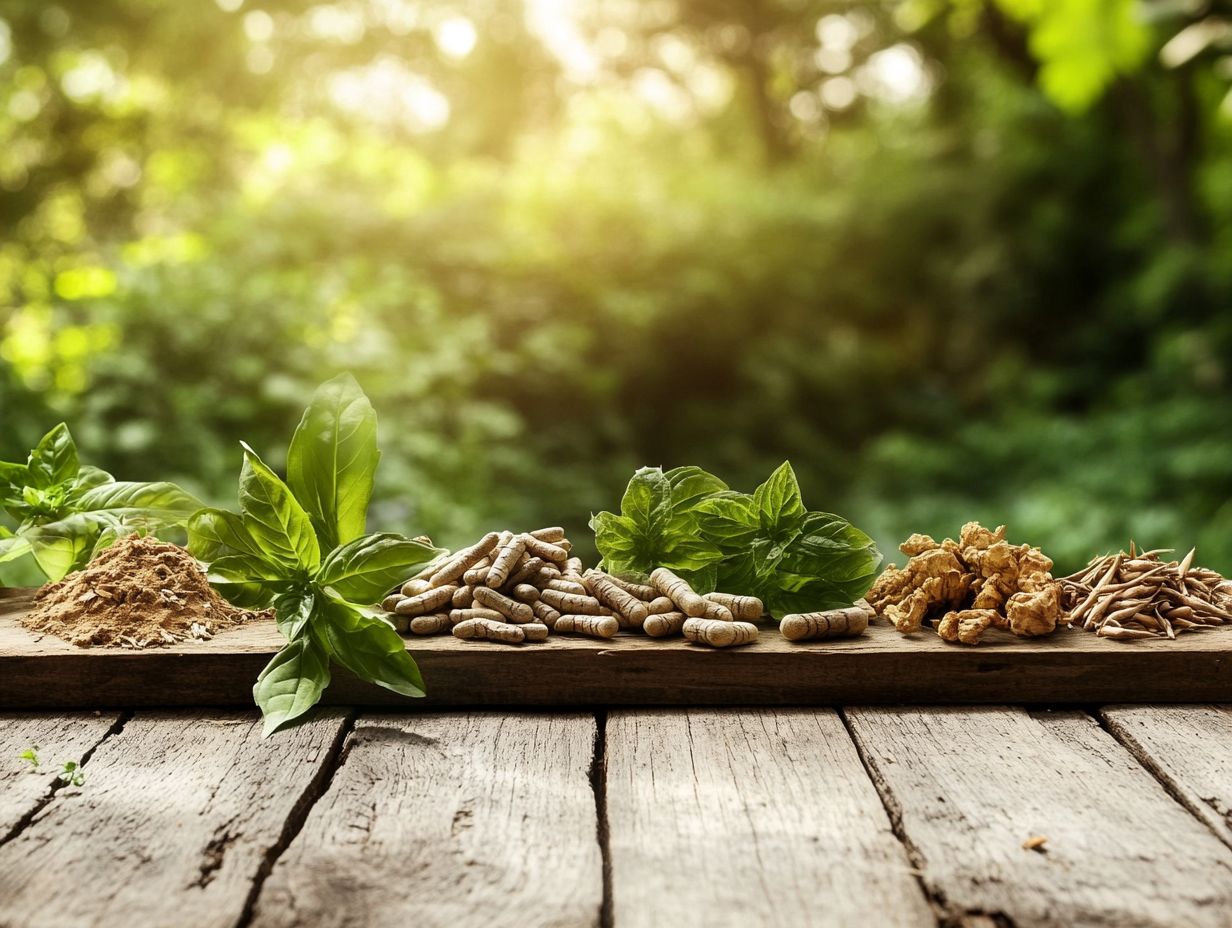
- Ashwagandha, Rhodiola, and Holy Basil are top adaptogenic herbs for stress relief.
- These herbs help regulate the body’s stress response and promote balance.
- Incorporating adaptogenic herbs into your daily routine can effectively manage stress without side effects.
1. Ashwagandha
Ashwagandha is a renowned herb known for its exceptional ability to reduce stress and anxiety and improve your overall health. Sourced from the root of the Withania somnifera plant, this remarkable herb helps balance hormones, elevate energy levels, and sharpen mental activities.
Medical experts highlight its critical role in boosting the immune system and combating fatigue, making it a valuable ally in modern health management.
Recent studies reveal Ashwagandha’s diverse benefits, showing its potential to lower cortisol levels an essential factor in stress regulation. Its adaptogenic qualities empower your body to navigate various stressors, cultivating a more resilient mindset. Users often report improved sleep quality and a boost in mood, suggesting this herb may nurture emotional well-being.
By integrating Ashwagandha into your daily routine, you might discover a new level of balance, making it an invaluable resource in today s fast-paced world.
2. Rhodiola
Rhodiola is a celebrated herb known for its ability to combat stress and enhance energy levels, proving advantageous for both physical and mental activities.
Rhodiola comes from the cold mountains of Europe and Asia and has a rich history in traditional medicine, primarily used to fend off fatigue. Recent studies reveal that Rhodiola not only alleviates stress-induced fatigue but also strengthens the immune system, offering a compelling dual benefit during challenging times.
Research from the University of California found that participants who supplemented with Rhodiola reported lower levels of fatigue and enhanced resilience to stress. This remarkable herb supports overall well-being, making it a valuable ally as you navigate the complexities of modern life.
3. Holy Basil
Holy Basil, often referred to as Tulsi, is an esteemed herb in Ayurvedic medicine, celebrated for its powerful adaptogenic properties that help you manage stress, elevate your mood, and promote overall wellness.
This remarkable plant has a rich history, used not just in culinary delights but also for its extraordinary ability to enhance mental clarity and emotional resilience. Traditional medicine practitioners recognize Tulsi’s vital role in balancing your body’s stress response, helping you navigate daily challenges with greater ease.
Today, you ll find extracts of Holy Basil commonly featured in wellness teas and supplements, making it readily available for those seeking holistic solutions for anxiety and depression.
Holy Basil also plays an important role in supporting your immune system, reducing inflammation and bolstering your body s natural defenses.
4. Reishi Mushroom
Reishi Mushroom, often hailed as the ‘mushroom of immortality,’ is celebrated for its adaptogenic properties that help reduce stress and tiredness while strengthening your immune system.
Historically, this extraordinary fungus has been a staple in traditional medicine for centuries, especially in eastern practices where it was cherished for its potential to promote longevity and enhance overall vitality.
With its abundant bioactive compounds, including triterpenes and polysaccharides, Reishi has caught the eye of both herbalists and modern researchers. They re diving into how this remarkable mushroom can elevate mental clarity and emotional resilience.
By weaving Reishi into your daily routine, you may find solace from everyday anxieties. You can also experience a comprehensive boost in your physical health, fostering a synergy that nurtures a balanced lifestyle.
5. Schisandra
Schisandra, a remarkable adaptogen, stands out for its ability to reduce stress while enhancing both cognitive function and overall health. Known as the “five-flavor fruit,” this extraordinary herb has been a staple in traditional medicine, particularly within the realm of Chinese herbal practices, for centuries.
As you explore Schisandra, you may notice a significant boost in your energy levels, enabling you to face daily challenges with renewed vigor. Scientific studies have shed light on its potential to support mental clarity, with some research suggesting it can enhance endurance and cognitive performance. It s a great choice for boosting both physical and mental resilience.
Its unique compounds not only bolster immune function but also foster a harmonious state of well-being, further cementing Schisandra s reputation as a natural ally in your pursuit of improved health.
6. Ginseng
Ginseng, one of the most celebrated adaptogens, is famous for boosting your energy levels, improving cognitive function, and offering valuable support in managing stress.
Among the various types of ginseng, Panax ginseng particularly shines for its powerful effects on stamina and mental clarity, making it a cornerstone of traditional medicine practices throughout Asia. On the other hand, American ginseng is revered for its adaptogenic properties, assisting your body in handling stress while also encouraging a state of relaxation.
Each variety possesses unique compounds that contribute to their distinct health benefits. Ongoing scientific research continues to delve into their impacts on immunity, inflammation reduction, and overall vitality.
As the interest in natural remedies flourishes, gaining a deeper understanding of these diverse ginseng varieties becomes increasingly important, effectively merging traditional wisdom with contemporary medicinal insights.
7. Licorice Root
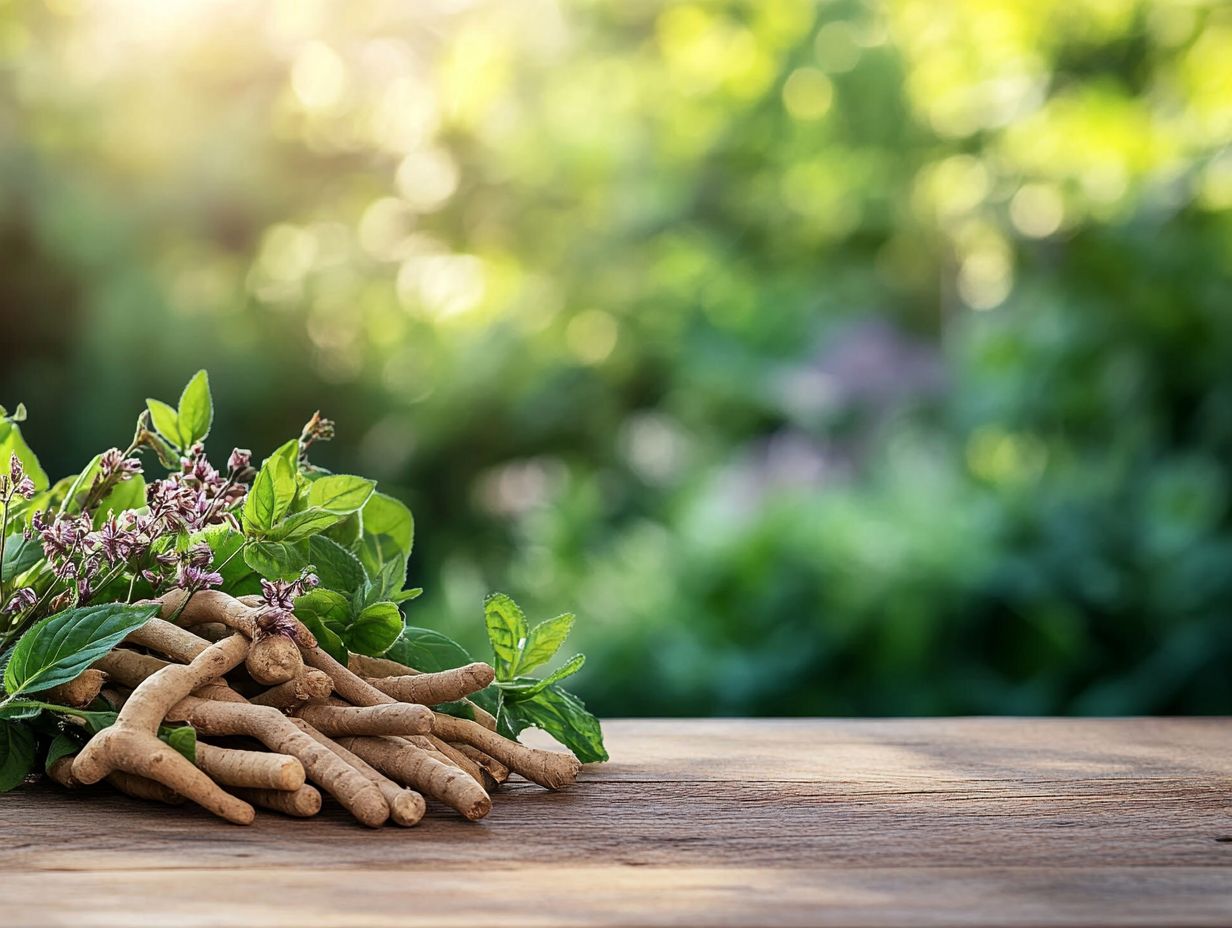
Licorice Root, though often overshadowed by more popular herbs, is a powerful adaptogen renowned for its ability to support balance of hormones and bolster the immune system while easing stress.
Historically, this herb has found its place in various cultures, especially within Chinese and Ayurvedic medicine, where it has been used to combat adrenal fatigue and enhance overall vitality.
Recent research has started to highlight its significant role in managing stress hormones, particularly cortisol (the stress hormone), suggesting that it may help temper the body’s stress response.
Studies indicate that licorice root can assist in regulating levels of estrogen and progesterone, ultimately contributing to improved hormonal health. As a versatile herbal remedy, it can easily be integrated into your routine through teas and supplements, offering a natural approach to stress management and hormonal regulation.
Don t miss out on the benefits of Licorice Root!
8. Maca
Maca is a remarkable root vegetable from the Andes that can help your body adapt to stress. It is celebrated for its ability to elevate your energy levels and enhance your mood while effectively managing stress.
This superfood is packed with vitamins, minerals, and amino acids, offering a distinctive blend of nutrients that support your overall health. For centuries, indigenous cultures have harnessed the power of maca to boost fertility and endurance, viewing it as a natural remedy to enhance vitality.
Modern research underscores its potential to promote cognitive function and emotional stability, making it a sought-after choice for those in pursuit of mental clarity and focus. Discover how maca can bring a new level of energy and mood enhancement to your life, whether you incorporate it into smoothies or energy bars.
9. Cordyceps
Cordyceps is a fascinating fungus that stands out for its remarkable ability to enhance energy levels, support your immune system, and help combat fatigue and stress.
In traditional medicine, this extraordinary organism has been utilized for centuries to boost vitality and endurance, making it a favorite among athletes who seek to elevate their physical performance.
As you explore its potential benefits, you may find that it not only increases your stamina but also aids in quicker recovery after those intense workouts. This unique fungus also supports mental clarity and reduces stress, helping you achieve a harmonious balance in both body and mind.
Cordyceps is highly regarded for its potential to promote overall health by improving respiratory function and enhancing blood circulation.
10. Astragalus
Astragalus is a cherished herb in traditional Chinese medicine, celebrated for its ability to help your body adapt to stress, especially when it comes to bolstering your immune system.
This ancient root has been a staple for thousands of years, often appearing in herbal blends designed to promote longevity and vitality. It has commonly been blended into remedies to combat fatigue and enhance overall well-being.
Today, the health benefits of astragalus extend far beyond just immunity. Research reveals its potential to improve heart health, combat inflammation, and even help regulate blood sugar levels.
By weaving this remarkable herb into your holistic approach to stress management, you can harness its natural calming effects, making it a valuable addition to your daily routine focused on both physical and emotional wellness.
What Are Adaptogenic Herbs and How Do They Work?
Adaptogenic herbs, such as Ashwagandha and Rhodiola, are your allies in navigating life’s stressors. They work to promote health and stability for your immune system while enhancing both cognitive function and mood.
These remarkable herbs have been celebrated in traditional herbalism for centuries, and recent research is continually unveiling their effectiveness in managing stress and anxiety, ultimately contributing to your holistic wellness.
Their magic lies in how they modulate your body’s stress response system, particularly through the system in your body that controls stress responses. By balancing cortisol levels and supporting adrenal function, these botanicals mitigate the physical and mental toll of stress.
Cultures in India and Russia have long recognized the power of these herbs, integrating them into their wellness practices long before modern science began to validate their benefits. As contemporary studies increasingly support these age-old claims, you might find yourself among the many who are turning to adaptogens as a natural way to enhance well-being and resilience in today’s fast-paced world.
Explore these herbs further and try incorporating them into your daily routine for a natural boost in energy, mood, and overall wellness.
How Can Adaptogenic Herbs Help with Stress?
Adaptogenic herbs play an essential role in managing stress. They help regulate your body s response to various stressors, effectively reducing anxiety and promoting a harmonious state of health and wellness.
These remarkable plants work by modulating your glands that help manage stress to maintain balanced cortisol levels, the hormone often linked to stress. For example, Ashwagandha is known for lowering cortisol and enhancing mood. Meanwhile, Rhodiola Rosea is recognized for its invigorating properties, helping you combat fatigue and improve mental clarity.
Another powerful adaptogen is Holy Basil, which not only reduces stress but also fosters emotional balance and resilience. Incorporating these herbs into your daily routine allows you to cultivate a supportive environment for mental well-being and emotional stability, laying a strong foundation to tackle life s challenges with confidence.
What Are the Different Types of Adaptogenic Herbs?
There s a diverse array of adaptogenic herbs, each offering unique benefits for managing stress, enhancing cognitive function, and supporting your immune system.
Among these plants, Rhodiola rosea shines with its energy-boosting properties and ability to combat fatigue perfect for those juggling demanding work schedules.
Ashwagandha is known for its calming effects, particularly in easing anxiety and improving sleep quality.
Holy Basil (Tulsi) alleviates stress and boasts antioxidant properties that safeguard your cellular health. While Ashwagandha encourages relaxation, Holy Basil fortifies your overall resilience.
By understanding these distinctions, you can make informed choices about which adaptogens best suit your individual health needs.
How Can One Incorporate Adaptogenic Herbs into Their Daily Routine?
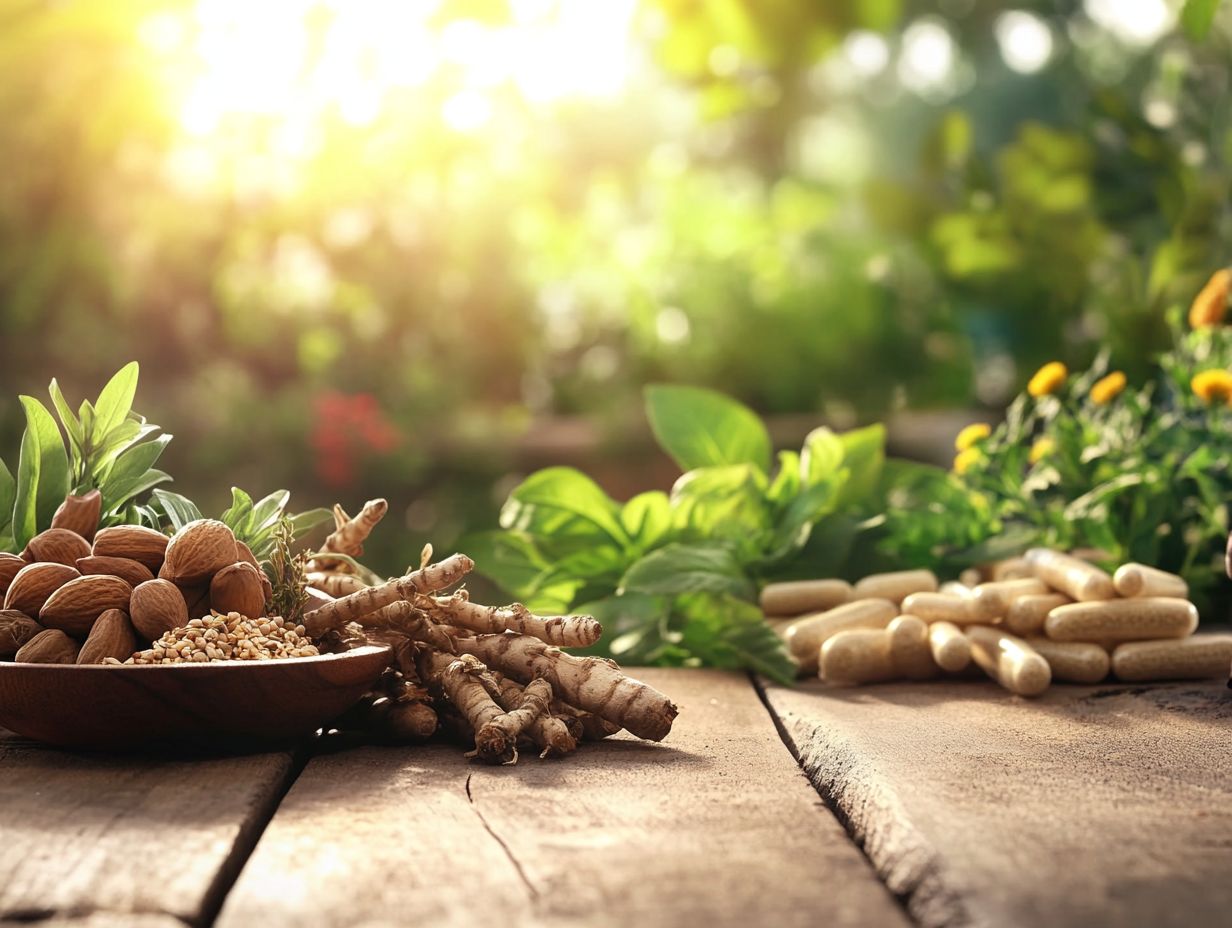
Incorporating adaptogenic herbs into your daily routine can enhance your wellness and help you manage stress more effectively. There are various methods to truly reap their benefits.
To harness the power of these herbs, consider brewing adaptogen-infused teas, adding powdered forms to your smoothies, or integrating them into meals like soups and stir-fries.
When adding these herbs to your diet, pay attention to dosage; starting with smaller amounts allows for a gradual adjustment. Timing is also essential taking them in the morning can provide you with energy to carry you through the day, while others may be more beneficial in the evening for relaxation.
This balanced approach ensures that these herbs support your overall well-being without overwhelming your system.
What Are the Possible Side Effects of Using Adaptogenic Herbs?
While adaptogenic herbs are generally viewed as safe, some individuals might experience side effects that deserve attention, especially regarding health and stress management.
These potential side effects can vary, including mild digestive issues or more serious reactions like allergic responses or hormonal imbalances.
Herbal interactions with body systems can be complex. It s essential to consult with medical experts before incorporating any new adaptogen into your wellness routine.
Doing so ensures that your specific health conditions are considered and that any potential contraindications with your current medications are carefully evaluated. Engaging with healthcare professionals will provide guidance and reassurance, allowing for a tailored and safe approach to harnessing the benefits of these powerful plants.
Can Adaptogenic Herbs Interact with Medications?
It s important to consider the potential interactions between adaptogenic herbs and your medications, as these can significantly influence your health results and stress management strategies.
For example, if you re combining adaptogens like ashwagandha or rhodiola with antidepressants (medications for depression), you might enhance the effects or face unpredictable results, which could impact your overall mental health stability. If you re using blood thinners, you should also be cautious, as certain adaptogens can affect clotting factors.
Be sure to talk to your healthcare provider before introducing any new supplements into your routine. This ensures that you fully understand the potential interactions, allowing you to make informed decisions about your health while protecting the effectiveness of your ongoing treatments.
Are There Any Contraindications for Using Adaptogenic Herbs?
Understanding contraindications for using adaptogenic herbs is essential, as certain health conditions may limit their effectiveness and appropriateness in managing stress.
If you have autoimmune disorders, it’s wise to be cautious with these herbs, as some could further stimulate your immune system and potentially worsen your condition. Similarly, if you’re dealing with hormone-sensitive issues, like certain types of cancer, adaptogens might disrupt your hormonal balance.
Individuals who are pregnant or breastfeeding should also approach adaptogens carefully, as their effects on fetal and infant development haven t been thoroughly studied.
It s vital to consult with a healthcare provider before weaving these herbs into your wellness routine to ensure they align with your specific health needs and don t introduce any risks.
How Can One Determine the Right Dosage for Adaptogenic Herbs?
Finding the right dosage for adaptogenic herbs is crucial for achieving optimal health benefits while effectively managing stress and enhancing your overall well-being.
To find the appropriate dosage, start by considering your body weight. If you weigh less, you may need smaller doses than someone heavier. It s also important to consider any existing health conditions, as these can significantly influence how your body responds to specific herbs.
The method of consumption also matters whether you prefer tinctures, powders, or capsules can impact the absorption of the adaptogen. Working with a healthcare professional can further help you refine the dosage tailored specifically to your unique needs.
What Are Some Tips for Choosing High-Quality Adaptogenic Herbs?
Choosing high-quality adaptogenic herbs is vital for unlocking health benefits and managing stress effectively, as not all products deliver the same results.
To make a well-informed choice, pay attention to where these herbs come from. Opt for those that are organically grown in their native habitats. Understanding the preparation methods is equally important; look for products that use gentle extraction methods to preserve the potency of the active compounds.
Certifications like USDA Organic or Non-GMO Project Verified serve as reliable indicators of quality and safety. By evaluating these factors, you can elevate your wellness journey and ensure you’re harnessing the full therapeutic power of your selected adaptogens.
What Are Some Other Natural Ways to Manage Stress?
Besides incorporating adaptogenic herbs, you have a wealth of natural methods at your disposal to effectively manage stress, promote health, and enhance both physical and cognitive function.
Mindfulness practices, for example, invite you to focus on the present moment, alleviating anxious thoughts and cultivating a profound sense of calm. Regular physical activity is another powerful tool; it not only boosts your mood through the release of endorphins, but also builds resilience against life’s stressors.
Being mindful of your dietary choices can also make a significant impact. By incorporating nutrient-dense foods, you support your brain function and improve your overall energy levels. Together, these holistic approaches create a harmonious synergy that enhances your well-being, empowering you to navigate life’s challenges with greater ease.
Start exploring adaptogenic herbs today to elevate your wellness!
Frequently Asked Questions
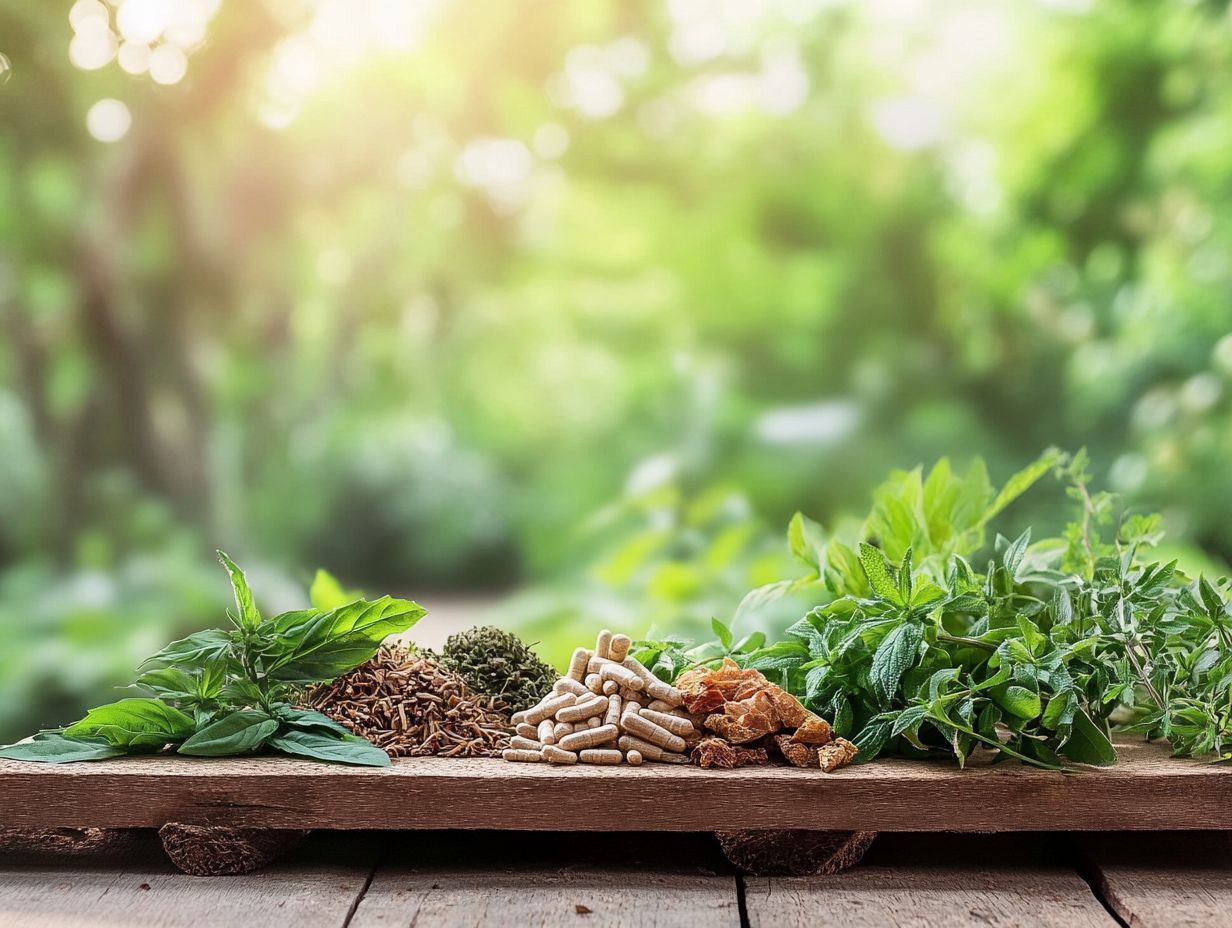
What are adaptogenic herbs and how can they help with stress management?
Adaptogenic herbs help your body cope with stress. They support your natural response and promote balance.
What are the top 10 adaptogenic herbs for stress management?
Here are the top 10 adaptogenic herbs for stress: ashwagandha, rhodiola, holy basil, licorice root, reishi mushroom, maca root, schisandra, Siberian ginseng, astragalus, and eleuthero. For more insights, check out the top 10 herbal remedies for stress relief.
How does ashwagandha help with stress management?
Ashwagandha is a powerful adaptogen used in Ayurvedic medicine. It lowers cortisol, the stress hormone, and promotes relaxation.
Can adaptogenic herbs be taken in combination with each other?
Yes, you can combine adaptogenic herbs. Many supplements blend different herbs for effective stress management.
Are there any side effects of using adaptogenic herbs for stress management?
Adaptogenic herbs are typically safe with few side effects. Always consult a healthcare professional before starting new supplements, especially if you have medical conditions or take medications.
How can adaptogenic herbs be incorporated into a daily routine?
You can take adaptogenic herbs in capsules, powders, teas, or tinctures. Add them to smoothies, soups, or use them in cooking to easily include them in your daily routine.

